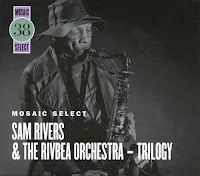By the time Sam Rivers was able to document his orchestral writing in 1974 (on the Impulse album "Crystals") at the tender age of 51, he was best known for leading a magnificent, purely improvised trio devoid of all written music. But composition was (and is) as much a part of his incessantly fertile mind as improvisation.
In 1992, Rivers moved to Orlando, Florida where he quickly formed another powerful improvising trio and set about seeking personnel to form an orchestra for the music that he was constantly writing. After two all-star albums for RCA Records in 1998 ("Inspiration" and "Culmination"), recorded in New York, an Orlando edition of the Rivbea Orchestra started to emerge.
Drawn from teachers and students at surrounding colleges, frustrated members of various Walt Disney World aggregations and retired veterans of orchestras like Tommy Dorsey and Woody Herman, Sam Rivers crafted a first-class orchestra to realize his music. In 2005, he issued the new Rivbea Orchestra's first recording "Airora" on his own Rivbea label.
When we heard the album, we called Sam to offer our jaw-dropping praise, he told us essentially there is plenty more where that came from and set about sifting through hours of studio and live recordings to cull the three CDs of previously unreleased material contained in this set. The results are forward-thinking and electrifying.
01. Spice (8:52)
02. Ganymede (9:05)
03. Crux (8:13)
04. Aura (15:48)
05. Perkin (9:39)
06. Pulsar (14:13)
CD2 - Progeny:
01. Robyn (6:21)
02. Cindy (5:47)
03. Monique (6:45)
04. Traci (5:10)
05. Iisha (4:43)
06. Tamara (5:21)
07. Tiffany (5:41)
08. Jessica (7:32)
09. Destiny (6:54)
CD3 - Edge:
01. Ridge (10:28)
02. Brink (11:05)
03. Precipice (9:29)
04. Verge (10:32)
05. Point (10:13)
06. Visions (11:39)
07. Pulsar (8:25)
Sam Rivers (soprano sax, tenor sax),
Jeff Rupert (1st alto sax)
Chris Charles (2nd alto sax)
David Pate (1st tenor sax)
George Weremchuk (2nd tenor sax)
Brian Mackie (baritone sax)
Tom Parmenter (1st trumpet),
Brian Scanlon (2nd trumpet)
Mike Iapichino (3rd trumpet)
David Jones (4th trumpet)
Keith Oshiro (1st trombone)
Tito Sanchez (2nd trombone)
Steve Smith (3rd trombone)
Josh Parsons (4th trombone, tuba)
Doug Mathews (bass)
Rion Smith (drums).
Recorded live at the Plaza Theatre, Orlando, Florida on November 12, 2008
CD2:
Sam Rivers (tenor sax),
Jeff Rupert (1st alto sax)
Chris Charles (2nd alto sax)
Charlie DeChant (1st tenor sax),
George Weremchuk (2nd tenor sax)
Brian Mackie (baritone sax)
Tom Parmenter (1st trumpet)
Brian Scanlon (2nd trumpet),
Mike Iapichino (3rd trumpet)
David Jones (4th trumpet)
Keith Oshiro (1st trombone)
David Sheffield (2nd trombone)
Claire Courchene (3rd trombone)
Josh Parsons (4th trombone, tuba)
Doug Mathews (bass)
Rion Smith (drums)
Recorded at Sonic Caldron Studios, Casselberry, Florida on February 27, 2008
CD3:
Sam Rivers (soprano sax)
Jeff Rupert (1st alto sax)
Chris Charles (2nd alto sax)
Charlie DeChant (1st tenor sax)
David Pate (2nd tenor sax)
Brian Mackie (baritone sax)
Tom Parmenter (1st trumpet)
Brian Scanlon (2nd trumpet)
Mike Iapichino (3rd trumpet)
David Jones (4th trumpet)
Keith Oshiro (1st trombone)
David Sheffield (2nd trombone),
Steve Smith (3rd trombone)
Josh Parsons (4th trombone, tuba)
Doug Mathews (bass)
Rion Smith (drums)
Recorded live at the Plaza Theatre, Orlando, Florida on April 8, 2009











